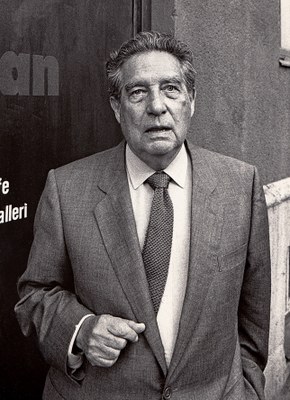Experts discuss the political legacy of Octavio Paz
 |
|---|
|
Octavio Paz: poet, essayist, translator |
On July 31, at 11:30 am, the Institute of Advanced Studies of the University of São Paulo (IEA), in partnership with El Colegio de México, will hold the conference Octavio Paz y la Política. The event will take place in the Ruy Leme Room, at USP’s School of Economics, Administration and Accounting.
Presented by historian Francisco Javier Garciadiego Dantán, president of El Colegio de México, the conference is a tribute to the birth centennial of Octavio Paz Lozano (1914-1998), the notable Mexican poet and essayist, internationally acclaimed as one of the greatest thinkers in Latin America in the 20th century.
Winner of the Nobel Prize in Literature in 1990, the only one awarded to a Mexico-born writer, Octavio Paz’s essays inspired broad reflections on Mexican politics and its international context. An editor, translator and diplomat, he was the author of major works such as The Labyrinth of Solitude (1950), Posdata (1969), The Philanthropic Ogre (1978), One Earth, Four or Five Worlds (1983) and Pequeña Crónica de Grandes Días (1990).
According to Garciadiego Dantán, the conference will seek to “reconstruct the path and evolution of Paz’ political thought, retracing the genesis and consolidation of a unique kind of political liberalism.”
Celso Lafer, president of FAPESP, will be one of the forum panelists. Professor emeritus at USP’s Institute of International Relations and member of the Brazilian Academy of Letters, Lafer was a student of Octavio Paz at Cornell University, and, together with Haroldo de Campos, organized the first anthology of essays by the Mexican writer published in Brazil, a milestone in the dissemination of Paz’ works in our country.
Carlos Guilherme Mota, professor emeritus at USP’s School of Philosophy, Literature and Humans Sciences and director of the Brasiliana Guita e José Mindlin Library, will also be a panelist at the event.
Doctor in Literary Theory and Comparative Literature from the University of São Paulo and Director of the Lasar Segall Museum, Jorge Schwartz will act as mediator.
The conference is open to the public and admission is free. Certificates of attendance will be issued to participants. The Ruy Leme Room is located at Av. Luciano Gualberto, 908, Cidade Universitária, São Paulo, SP (map). The event will also be broadcast live on the Web. For information and registration, please send a message to leila.costa@usp.br.
English revision by Carlos Malferrari
